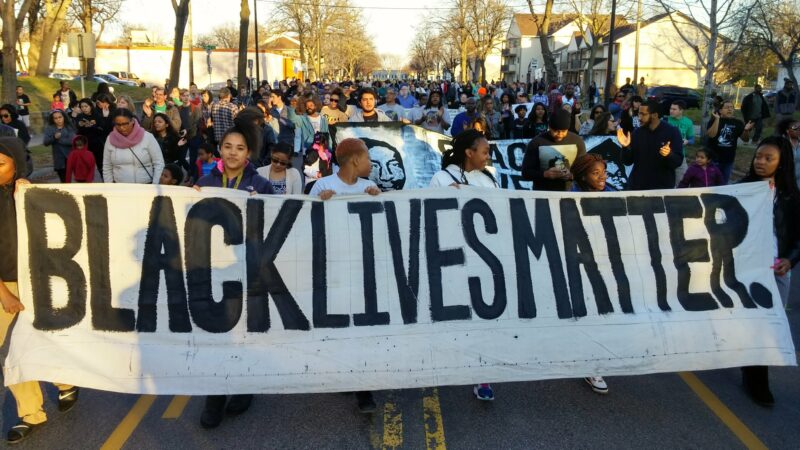The Joint Committee on Human Rights says ambiguity over our right to protest must be scrapped

The right to protest during lockdown should be put on the same footing as communal worship, says the Joint Committee on Human Rights (JCHR).
There has been a lot of ambiguity around the right to protest during the pandemic over the last year when, fundamentally, it is a human right.
The ambiguity was there during the Black Lives Matter protests last year and during recent protests against the Crime and Police Bill in Bristol.
Police even intervened during the peaceful vigil for Sarah Everard on Clapham Common, and many criticised their actions.
This is all happening alongside the consideration of the the controversial Police, Crime, Sentencing and Courts Bill, which if passed would diminish our right to protest, for example by giving police chiefs the power to impose start and finishing times and to set noise limits.
It’s why the JCHR is calling for this right to be made clearer, and for proper guidelines to be put in place so it can be done with minimal impact on public health during the pandemic.
These events have sparked a national debate around the right to protest, even in the midst of the pandemic, and the JCHR have said that this right must be made clearer. It needs to be put on the same footing as our right to picket and our right to take part in communal worship.
The JCHR is now calling on the Government to bring forwards regulations to amend the law and make it clear that protest is permitted during the pandemic if conducted in a manner that reduces public health risks to an acceptable level. The JCHR report, The Government response to covid-19: freedom of assembly and the right to protest, includes draft legislation which would have this affect.
Gathering to protest is not, and has never been, totally illegal during the pandemic, even in lockdown. The Government has, however, provided a general prohibition on gatherings and have listed lawful exceptions. Under this current lockdown, protest has not been included in the lawful exceptions.
But the right to protest is a human right and as such the right to protest safely has to be accommodated within the general defence of “reasonable excuse” because otherwise the law wouldn’t be compatible with the Human Rights Act 1998 and the right to peaceful assembly under Article 11 of the European Convention of Human Rights.
The confusion has remained throughout all three lockdowns, according to the report, and its left the public unsure about their rights and at risk of arbitrary or discriminatory decision-making.
This ambiguity affects both the person wanting to protest and those who are required to enforce the law. It could lead to law enforcers interfering with human rights in ways that do not have a proper basis in law.
The JCHR has published draft regulations that would guarantee the right to protest in public outdoor places, if done safely, by putting protest on the same footing under lockdown restrictions as picketing and communal worship.
Under lockdown, as long as the ‘required precautions’ are in place, people may gather for communal worship in England, in line with the human right to freedom of religion under Article 9 of the ECHR. An exception to the ban on gathering also exists where the gathering is for the purposes of picketing as long as the organiser takes the ‘required precautions.’
The Chair of the Joint Committee on Human Rights, Harriet Harman QC MP, said: “The law on the right to protest during the pandemic has been a mess and the right to protest has not been protected. While the Government has rightly protected the right to assemble for religion, they have not properly protected the right to protest. The right to protests should have no less protection than the right to religious assembly.
“The right to protest is important and should be allowed, like other current exemptions, if it is carried out in a safe way. When people have to go to Court to establish whether their actions are lawful or criminal, as has happened most recently in the Reclaim These Streets Clapham vigil, it’s clear that the law is in a mess.
“The Joint Committee called for evidence on the human rights consequences of lockdown, including the right to protest, in November last year and heard evidence on protests in February.
“The events of last weekend show clearly how the lack of clarity and level of uncertainty in the law is unacceptable and must be remedied as a matter of urgency. This could be done right away as the Joint Committee on Human Rights has drafted the Regulations.”
Lucy Skoulding is a freelance reporter at Left Foot Forward. Follow her on Twitter.
Left Foot Forward doesn't have the backing of big business or billionaires. We rely on the kind and generous support of ordinary people like you.
You can support hard-hitting journalism that holds the right to account, provides a forum for debate among progressives, and covers the stories the rest of the media ignore. Donate today.



